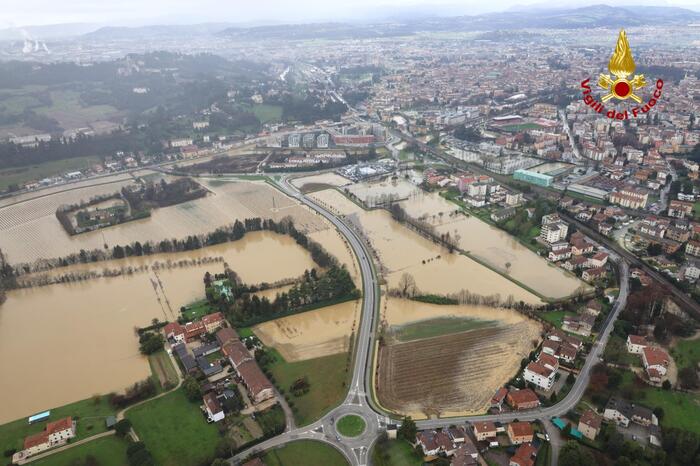Enlarge image
Flood damage in debt, Rhineland-Palatinate
Photo: Michael Probst / AP
One week after the heavy rain catastrophe in North Rhine-Westphalia and Rhineland-Palatinate, one thing is clear: we have to rethink Germany.
We need working sirens again, working warning messages on cell phones, and a functioning disaster control system.
And we also have to protect ourselves differently: In the future, homeowners will have to insure such damage caused by the forces of nature.
Such insurance against natural hazards should even be compulsory for everyone.
A school friend lives in Bad Münstereifel.
When I was shocked, "Are you all right?", He replied last weekend: "Everything is fine, I live on the mountain, only 30 centimeters of water in the cellar."
In doing so, he simultaneously describes the dilemma of compulsory insurance and the most important reason for it.
For two decades, homeowners, insurers, politicians and economists have been arguing whether compulsory natural hazard insurance makes sense in view of the recurring billions in flood damage.
I found an interview in my archive from 2002 with Professor Gert Wagner from the German Institute for Economic Research DIW (now also a member of the Expert Council for Consumer Questions).
Even after the Elbe floods, he demanded compulsory insurance for natural hazards.
Why compulsory insurance makes sense
The main argument of the proponents: It cannot be that the pensioner in Berlin-Marzahn and the student in Münster pay their (value added) tax payments for damages that only homeowners can have.
Or have completely different disadvantages: During the Elbe flood in 2002, for example, the tax breaks that had been decided were postponed, with reference to the costs of the disaster.
Natural disasters are only the homeowner's risk.
You are the right group of insured people to share the damage.
The best side argument in favor of compulsory insurance: If it existed, every homeowner would get protection - even those who have previously been rejected.
The counter-argument has always been in the past twenty years: such risks - floods, heavy rain, earthquakes, snow breaks - only affect a small percentage of homeowners.
One could not hold all homeowners jointly liable.
And because one cannot hold all taxpayers liable with the same argument, the Prime Ministers decided something different in 2017, after the last great flood on the Danube.
They stated that homeowners who drown in such a flood should only receive government aid in exceptional cases.
"When granting aid, it should be taken into account in future that only those who can count on government support beyond so-called emergency aid who have unsuccessfully sought insurance or who were only offered this on economically unreasonable terms," it said.
The Prime Ministers of Saxony and Baden-Württemberg found this too weak even then.
They wanted a real compulsory insurance against natural hazards, no indirect pressure to take out one.
The Saxons knew the obligation from the GDR and the "floods of the century" on the Elbe and Oder from 1997, 2002, 2006 and 2013. Between Mannheim and Constance there was the obligation from 1960 to 1994, as it is today as part of fire insurance in neighboring Switzerland.
In the mountainous southwest today over 90 percent of homeowners still have protection, in the mountainous Rhineland-Palatinate only 37 percent.
The new flood, probably worth billions, now seems to have started a rethink.
After the federal election, compulsory insurance should be checked.
Especially the Minister of Justice of North Rhine-Westphalia, Peter Biesenbach, urges it.
The justice ministers of the federal states had argued in 2017 that the damage would affect far too few households for a duty.
In NRW that was at least astonishing, as the weather researchers measured 292 liters of water per square meter in one day in 2014 during heavy rain in the tranquil Münster.
40 million cubic meters of water came down in a few hours, as much as Berlin's Müggelsee can hold two people died.
Insurers, who have long been concerned about climate change, are also putting pressure on them.
According to the analysis by the insurance association GDV, three out of four buildings in Germany are located in areas that are moderately or severely endangered by such heavy rain events.
It is said that changing the climate with more warmth is likely to favor even more abundant rain.
And the faster warming over the North Pole slows the jet stream, low or high pressure areas probably stay longer in one place and bring tropical heat or heavy rain.
The majority of homeowners are now affected by the heavy rain, not the minority.
What you can do now
It will take some time before legal changes take effect.
But if you own a house, you'd better act now.
As a homeowner, you can at least pimp their homeowner insurance.
You can upgrade it with an elementary damage insurance, which pays when the water runs in the apartment door because the gully is full.
Or the water flow has found its way past the gully into the garage and basement.
Incidentally, it also pays for earthquakes, avalanches, landslides or subsidence.
The “Natural Hazards Compass” gives an initial indication of how high the risk is at your location.
But even if it indicates a low risk, you are not necessarily off the hook.
Many homeowners have been left with damage in the past few years (unlike this disaster likely).
In the summer of 2017, for example, a depression flooded large parts of downtown Berlin and flooded thousands of cellars.
Six-lane roads became wide rivers.
The additional costs for natural hazards protection for building insurance are often between 10 and 35 percent, »Finanztip« determined in spring 2021.
If your house has already been damaged several times, the insurer may not want to take out insurance.
If you find another insurer who offers you insurance against natural hazards, that is reason enough for an extraordinary termination.
Sometimes insurers require modifications.
These can be special windows, but also tiled rooms in the basement and ground floor.
Also important to the price is the damage deductible that you choose.
The higher your deductible, the lower the price.
Simply compare different deductibles and their effect on the price of the insurance on relevant portals such as "Mr-Money".
You can also do something as a tenant.
The best thing to do is to check whether it is worthwhile to upgrade your home insurance accordingly.
At least if you rent a single storey or have a basement with valuable items in it.
Make sure that your home contents insurance actually pays for the replacement costs of your equipment stored in the basement.
And then compare for the next year whether another residential building or household contents contract with natural hazards might be cheaper.
So far you have only been able to buy the protection coupled from the same insurer.
Hope in politics and the tax office
Anyone who now has the damage in the Eifel, Sauerland, Bavaria or Saxony must hope that the Prime Ministers did not take their 2017 threat so seriously.
Then there should be further construction aids after the emergency aid.
Either way, one thing is certain: flood victims can deduct the immense costs of the flood as extraordinary burdens from their taxes.
The financial administrations in North Rhine-Westphalia and Rhineland-Palatinate have issued corresponding regulations (points 4.5 and 4.6).
With a corresponding application for a wage tax reduction, this means that in the remaining months of this year much more net of the gross remains.
What you have to pay attention to in order to deduct your costs as comprehensively as possible can be found in the »Finanztip« section.
If after the election there is compulsory insurance, you should look again for cheaper offers for natural hazard insurance.
And at the same time be aware that heavy rain is not the only new climate risk here in Germany.
In 2018, 300 hectares of forest burned southwest of Berlin.
The Berliners could smell the smoke in central parts of the city like Schöneberg or Wilmersdorf.
Several hundred people from three villages had to be evacuated as a precaution.
A fire like this doesn't have to stop at the edge of town the next time.
So in Germany we will not only have to fight against climate change, but also against severe weather events that are already occurring, which may already be related to climate change. After all, fire damage is also paid for by traditional building insurance.














